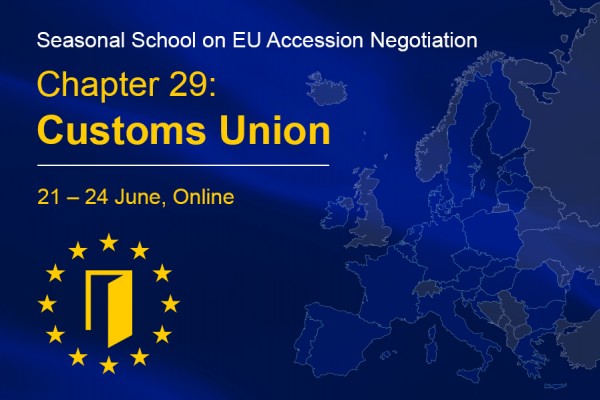
Seasonal School on EU Accession Negotiation tackled the challenges for the Western Balkans related to Chapter 29 (Customs Union)
ReSPA hosted virtual Seasonal School on EU Accession Negotiation – Chapter 29: Customs Union, in cooperation with European Commission DG TAXUD "Taxations & Customs" and CEFTA Secretariat. Traditionally, the school is a unique opportunity for teams dealing with EU accession negotiations from across Western Balkans administrations to come together, connect online, exchange views, network, share ideas, and discuss current and future challenges related to the EU accession process.
More than 40 participants have deepened their knowledge on the particular topic in the accession negotiation process and negotiation technics, as well as equipped with a concrete experience from Montenegro and Serbia with lessons learned on dealing with opening negotiation and work on closing benchmarks related to Chapter 29.
At its opening, Mr Dragan Đurić, ReSPA Programme Manager – Coordinator expressed his great gratitude to the DG TAXUD "Taxations & Customs" and CEFTA Secretariat for their strong support in organising the School. Also, he highlighted that Chapter 29 was chosen as very attractive by the ReSPA Members teams who are dealing with the accession negotiation process due to the facts that there were no opening benchmarks for this Chapter in the case of Montenegro and Serbia (both countries have three closing benchmarks, similar in structure and content) while Albania and North Macedonia are waiting on opening the negotiation process. Also, this topic was attractive for the representatives of governments of BiH and Kosovo*.
Mr Fernando P. de Pinninck, Head of Unit in DG TAXUD (EC), emphasized that customs union lays in the foundations of the EU and that the Seasonal School provides a good platform to learn more on this topic by civil servants from the Western Balkans and prepare them for negotiating this chapter.
One of the lecturers, Mr F. Vandenborre presented the EU Binding Tariff Information (BTI) and the role of Customs authorities in the Member States, while Ms Edna Karadža from CEFTA Secretariat, introduced the System of Electronic Exchange of Data (SEED), which serves as a regional Database that facilitates transport and trade of goods among the countries and economies in the region.
Representative of DG TAXUD (European Commission), Mr Antonio Blanco, explained in details the negotiating process for Chapter 29 and described the different phases that a candidate country should go through. He also emphasized the importance to open this chapter as soon as possible to timely fulfil the criteria required. The Free Trade Area in the Western Balkans (also known as Regional Economic Area) is essential for having a functional regional economy and standardized customs union.
Civil servants from Montenegro and Serbia introduced their concrete experience gained during the direct engagement in the negotiation of Chapter 29 with the EU, thoroughly describing the challenges but also the achievements.
Mr Emmanuel Kokolakis from TAXUD, EC, explained that “Tariff suspensions” refer to a total or partial waiver of the normal duties granted by the EU. A suspension can be granted on materials, goods and components if they are not available within the EU. Subsequently, some of the participants from the Western Balkans explained their national rules on tariff suspension and quota management, and altogether lively discussed the topic as well as on the similarities and differences between EU customs’ rules and those of the countries in the Region.
On the last day of the School Mr G.Dorey and Mr A.Marinescy, TAXUD, EC presented the Pan Euro Mediterranean transitional rules of origin while Ms Olivera Ceni Bardiqi provided insights on the impact of the PEM transitional Rules of Origin for CEFTA parties.
The overall conclusion of this year’s Seasonal School on EU accession negotiation is that the accession countries when negotiating Chapter 29 would not face many difficulties with the screening process, neither with the transposition of legislation into their internal legal framework, but the main challenge to be expected is related to the implementation of the customs IT infrastructure to align them with EU standards. This is an important message that shall be taken seriously into account by the representatives of Customs’ administrations across the Region.



